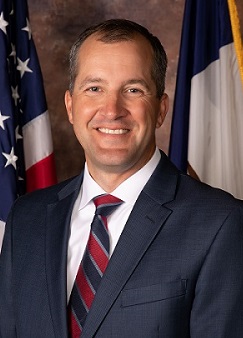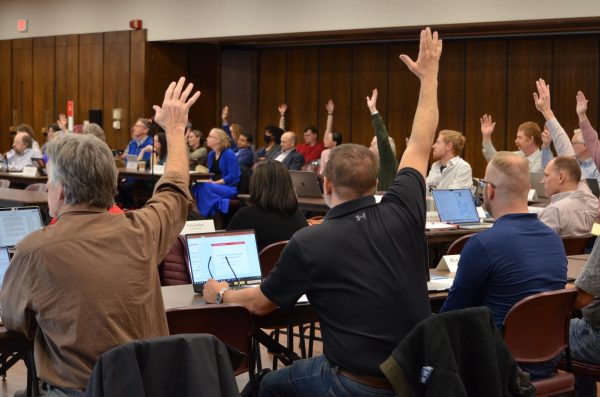Democratic candidate for Secretary of Agriculture speaks on soil and water quality
Courtesy of Iowa Press Debates' YouTube channel
Republican incumbent Mike Naig and Democratic challenger John Norwood disusing various campaign issues as featured on Iowa Press Debates.

Editor’s note: The Iowa State Daily attempted to reach out to Secretary Mike Naig four times and received no response.
Republican incumbent Mike Naig faces Democratic challenger John Norwood in the race for Iowa’s Secretary of Agriculture.
Candidates
Norwood currently serves as Polk county’s soil and water commissioner. Norwood has received a bachelor’s degree from Williams College, a masters from the Yale School of Forestry and a masters in business administration from the Yale School of Management.
Naig has served as secretary of agriculture since 2018. He received a bachelor’s degree in biology and political science from Buena Vista University. According to his campaign website, Naig aims to expand markets and trade, protect soil and water quality and ensure a brighter future for Iowa farmers.
Soil quality
Norwood said Iowa’s soils are not good, and he intends to focus on how to improve soil quality as secretary of agriculture.
“We’re leading the Midwest in our soil loss, and it’s massive,” Norwood said. “On a per acre basis, it’s over five tons per acre, so over 10 times the rate that’s sustainable that Mother Nature provides.”
Norwood said roughly a third of the state’s budget is washing down rivers as soil.
“We’re sending down our rivers, something like 145 million tons of soil per year,” Norwood said, “and if you put a dollar value on that, that’d be about $3 billion per year.”
Norwood said setting soil loss limits at the county level would begin to help reduce soil loss in Iowa, but he said cover crops and tillage practices also play key roles in preventing soil loss.
“It has to do with incentives,” Norwood said. “What are the incentives that we provide to public sector through things like the Farm Bill, it has to do with tax policy— …do we get some kind of a break, perhaps, for property owners who are practicing good soil health, because that has both a positive impact in the sustainability of that piece of farm ground, but it also matters to what happens downstream.”

Water quality
Norwood said the state of Iowa’s water quality is “dreadful.” He said since the adoption of the Nutrient Reduction Strategy in 2013, the amount of materials found in Iowa’s water has increased by over 30%.
“So the loading is going in the wrong direction, it’s going up, and it’s not too hard to understand why when you look at what’s happened since that plan was adopted,” Norwood said. “We’ve added another 3 million hogs — a million and a half hog spaces during that time. Each space produces about two hogs per year, so 1.5 times 2 gets you to about three — that’s the entire population, almost, of Iowa and pigs we’ve had.”
Norwood added that the tiling of corn and bean crops contributes to the quality of Iowa’s water.
“We have 23 million acres of corn and bean ground, 14 million of that’s tile, and about seven of that 14 is controlled by drainage districts,” Norwood said.
According to the Iowa Environmental Council, 54% of the waters tested by the Iowa Department of Natural Resources are impaired, making them unsafe for their intended uses, which may include fishing, swimming or drinking.
“I mean, it’s a crisis, it really is,” Norwood said, “and climate change is going to make it worse because climate change magnifies the water quality impacts and the soil loss — the two are related. And so, just imagine more intense rainfalls more frequently, and that’s when soil moves.”
Carbon pipelines
Norwood said carbon pipelines are not a good use of public money, but the power to approve or deny the construction of pipelines throughout the state lies with the legislature. He said should they exist in Iowa, he wants them to be constructed safely and ethically.
Norwood added that he thinks carbon pipelines should not qualify as eminent domain, a process in which the government can compensate and seize land from a property owner for public use.
“And so this, this doesn’t sort of pass the smell test — this is not a public utility,” Norwood said. “This isn’t a road right of way, which is typically what you see in these eminent domain proceedings.”
Norwood said if there are carbon pipelines in Iowa, they should be implemented with the consent of landowners; they must be fair to landowners and safe in respect to how they are routed.
“[A] better investment of the public money, I think, would be to figure out how to […] drive more biofuels into four too-hard-to-electrify markets,” Norwood said. “That’s airplanes, that’s boats, that’s trains and that’s long haul trucks.”
Your donation will support the student journalists of the Iowa State Daily. Your contribution will allow us to purchase equipment, send our student journalists to conferences and off-set their cost of living so they can continue to do best-in-the-nation work at the Iowa State Daily.













